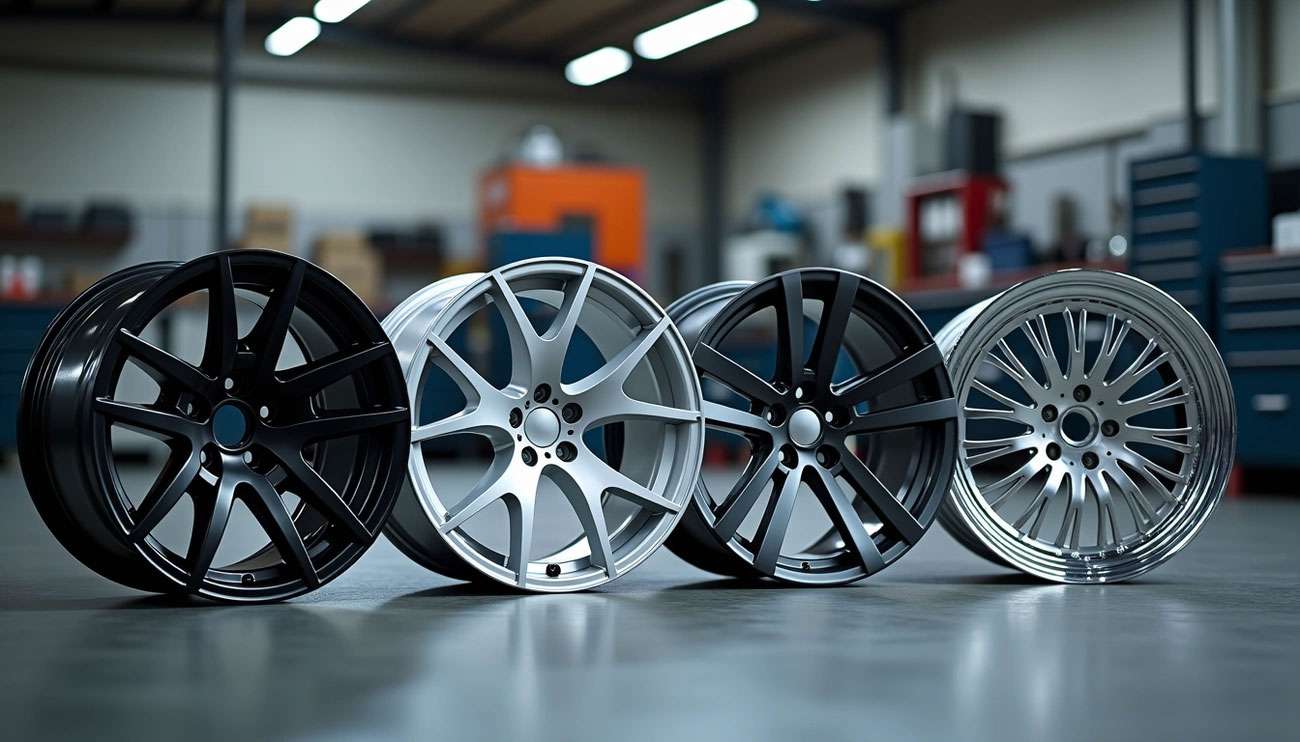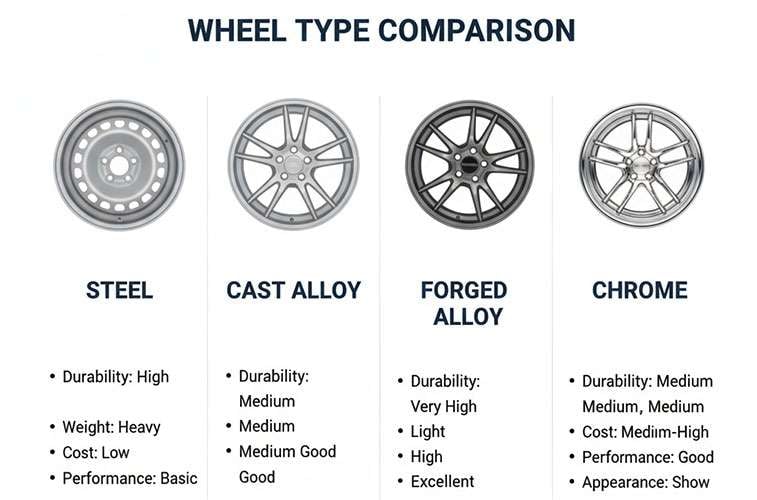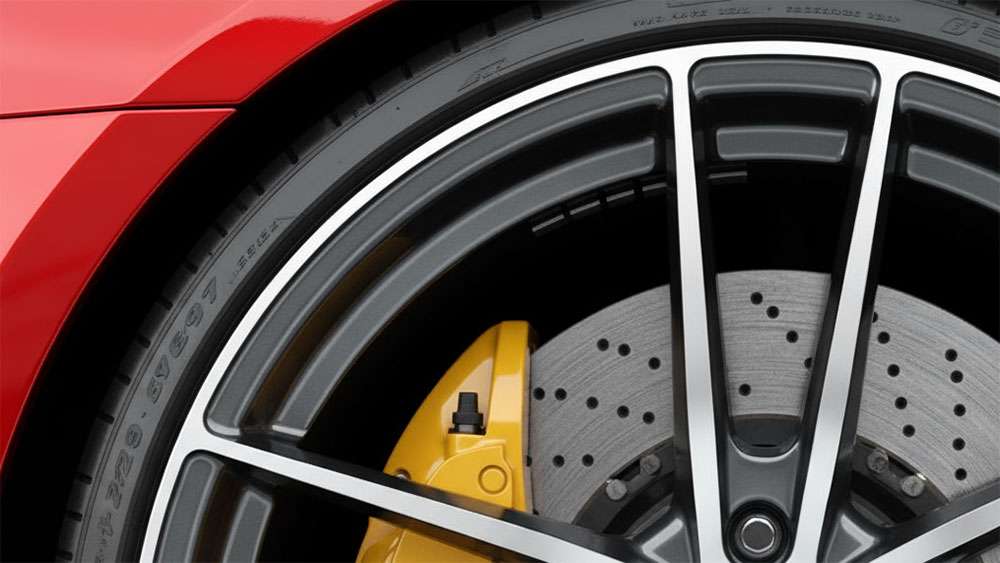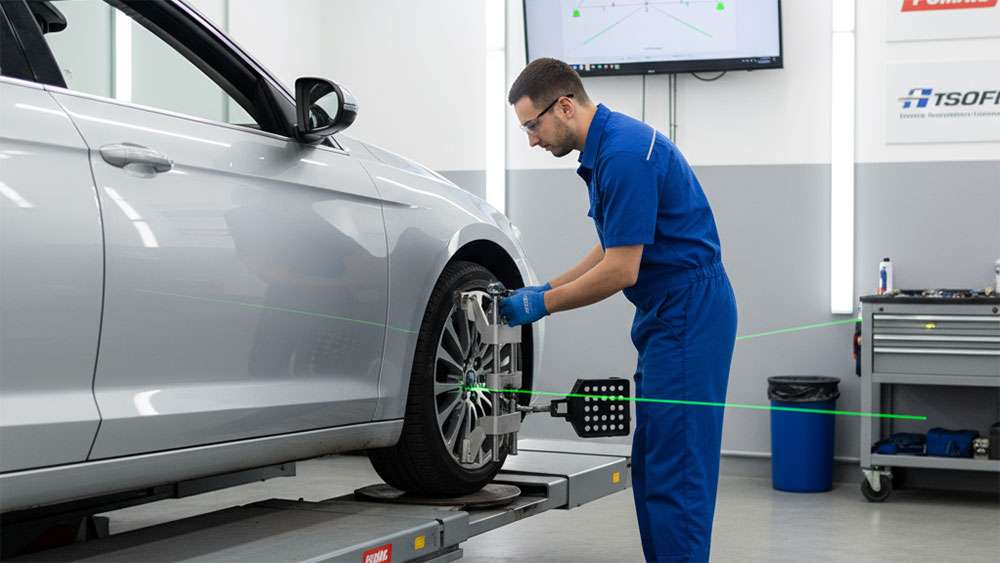
Steel wheels cost just $50-100 per wheel, while forged wheels command prices from $400-1,000+ per wheel. This significant price difference reflects the variety of car wheels available to vehicle owners today.
The four main categories of wheels include steel, alloy, forged, and chrome. Each type offers distinct advantages and considerations for different driving needs. Alloy wheels, primarily made from aluminum, dominate the modern car wheel market due to their balance of performance and style. Steel wheels provide exceptional durability at a lower cost, making them popular for harsh driving conditions. Wheel sizes vary significantly, ranging from compact 15-inch options to massive 26-inch designs.
When selecting wheels for your vehicle, performance matters as much as appearance. Larger wheels provide better grip and enhanced performance, while alloy wheels improve acceleration, braking, and fuel efficiency compared to heavier steel alternatives. The right choice depends on your specific driving requirements, whether you need everyday reliability or want enhanced performance capabilities.
Understanding wheel types helps you make informed decisions that balance performance, budget, and driving needs. We'll guide you through everything you need to know about car wheels, from materials and specifications to maintenance considerations that ensure you select the perfect wheels for your vehicle.

Car wheels come in various designs based on manufacturing processes, materials, and performance characteristics. We'll examine the five main types of car wheels available for your vehicle.
Steel wheels remain a popular choice for many vehicles due to their exceptional durability and budget-friendly pricing. Manufactured through a stamping process, these wheels consist of pressed carbon steel that provides remarkable strength under harsh conditions. Steel wheels offer excellent resistance to bending when hitting potholes or driving over rough terrain, making them ideal for off-road use or winter driving conditions.
Steel wheels do have some limitations to consider. They typically weigh more than other wheel types, which can negatively impact fuel efficiency and vehicle handling. While durable, they require maintenance to prevent rust formation over time. For drivers seeking reliability without breaking the bank, steel wheels provide a practical solution for everyday driving, especially in challenging environments.
Alloy wheels, primarily made from aluminum combined with other metals like nickel or magnesium, have become the standard on most modern vehicles. Their popularity stems from being significantly lighter than steel alternatives, which improves acceleration, braking response, and handling characteristics. The reduced unsprung weight allows the suspension to work more effectively, resulting in a smoother ride quality.
Beyond performance benefits, alloy wheels offer superior aesthetics with numerous designs and finishes available. Their enhanced heat conduction also improves brake performance by dissipating heat more efficiently than steel wheels. Although more expensive than steel options, alloy wheels provide an excellent balance of performance, style, and practicality for most drivers.
Forged wheels represent the premium segment of the wheel market. Created by applying tremendous pressure (up to 18 million pounds) to solid aluminum or special magnesium alloy billets, these wheels undergo a sophisticated manufacturing process that aligns the metal's grain structure for exceptional strength and reduced weight.
The forging process creates wheels that are both lighter and stronger than cast alternatives, optimizing the critical stiffness-to-weight ratio that serious performance enthusiasts seek. Though substantially more expensive than other wheel types, forged wheels deliver unmatched performance benefits for racing applications and high-performance vehicles where every ounce matters.
Chrome wheels instantly transform a vehicle's appearance with their distinctive mirror-like finish. Rather than being a separate wheel type, chrome refers to a specialized finish applied to aluminum or steel wheels through a three-step plating process that begins with copper for smoothness, adds nickel for durability, and finishes with chrome for brilliant reflection.
Popular models like TIS 544C, Fuel Maverick, Moto Metal MO962, and Vision Rocker 412 showcase chrome's visual impact with pricing ranging from around $123 for budget options to $765 for premium designs. While visually striking, chrome wheels require regular maintenance to preserve their shine, especially in areas with road salt or harsh chemicals.
Magnesium wheels represent the lightest option available, weighing 1.5 times less than aluminum and 4.5 times less than steel wheels. This extreme weight reduction dramatically improves vehicle performance by reducing unsprung mass and rotational inertia.
Beyond weight advantages, magnesium wheels offer exceptional vibration damping capabilities—up to 50 times better than aluminum. This property significantly reduces vehicle vibration, particularly in critical components like the engine, suspension, and transmission. Popular in Formula 1, DTM, Indy, NASCAR, and MotoGP racing, magnesium wheels remain rare in consumer applications due to their higher cost, potential corrosion issues, and limited finish options.
Find your next set of Wheels that balances your specific performance needs with style preferences and budget constraints.
Wheel specifications determine compatibility, safety, and performance for your vehicle. While wheel types focus on materials and construction, these technical measurements directly impact how wheels fit and function on your specific vehicle.
Wheel diameter represents the distance across the cylindrical surface where the tire bead sits, typically measured in inches. This measurement appears in wheel size designations such as "17 × 8.5 × +35," where 17 indicates a 17-inch diameter. This number must match your tire specifications for proper fitment.
Width refers to the inside distance between the bead seat faces. The 8.5 in our example signifies an 8.5-inch width. Selecting the appropriate wheel width affects tire sidewall shape, handling characteristics, and clearance within your wheel well. Wider wheels provide enhanced grip but may require tires with lower profiles to maintain overall diameter.
Offset (ET value) measures the distance from the hub-mounting surface to the wheel's centerline, expressed in millimeters. This measurement significantly influences how your wheels sit relative to suspension components and fenders. Positive offset places the mounting surface closer to the wheel's outer edge, while negative offset positions it closer to the inner edge.
Backspacing measures from the back of the mounting pad to the back lip in inches. An 8-inch wide wheel with zero offset would have 4 inches of backspacing. These measurements work together—you can convert between them using formulas when you know the wheel's width.
Bolt pattern specifies how wheels attach to your vehicle through the number and position of mounting holes. This pattern consists of two numbers: the lug count (typically 4, 5, 6, or 8) and the bolt circle diameter (BCD) or pitch circle diameter (PCD). A 5×100 pattern indicates 5 lugs spaced evenly around a 100mm diameter circle.
Measuring bolt patterns varies by lug count. For 4-lug wheels, measure directly across from one hole to another; for 5-lug wheels, measure from the center of one hole to the outer edge of the farthest hole. Using the correct bolt pattern remains essential—over 30 different patterns exist, most incompatible with each other.
Wheel load rating defines the maximum weight a single wheel can safely support. This critical specification appears stamped on the back of most wheels as "MAX LOAD" followed by a weight in pounds. The rating depends on factors including material, design, and construction process.
To determine your required load capacity, divide your vehicle's heaviest gross axle weight rating (GAWR) by two. A Toyota 4Runner TRD Pro with a rear GAWR of 3,439 pounds needs wheels rated for at least 1,719.5 pounds each. Exceeding load ratings can lead to structural failure, poor handling, and unsafe driving conditions.
Your wheel choice affects nearly every aspect of your vehicle's performance. From fuel consumption to handling dynamics, the wheels you select create noticeable differences in how your car behaves on the road.
Wheel weight directly influences how much fuel your vehicle consumes. Heavier wheels require more energy to rotate, particularly during acceleration, which translates to increased fuel usage. Testing data shows that larger and heavier wheels can reduce fuel efficiency by up to 10% when comparing 19-inch to 15-inch wheels.
Driving conditions determine the actual impact. City driving with frequent stops and starts magnifies the efficiency penalty of heavy wheels. Highway driving occasionally favors larger wheels because their improved rolling resistance can enhance efficiency at constant speeds.
Material choice plays a crucial role. Alloy wheels generally improve fuel economy by 2-5% compared to steel alternatives. This occurs because their lighter weight reduces rotational mass, requiring less engine power during acceleration.
Wheel selection dramatically alters your vehicle's handling characteristics. Larger wheels typically provide better traction through increased road contact, improving cornering stability and reducing braking distances by up to 20%. Their enhanced grip also translates to better overall handling.
However, larger wheels come with trade-offs:
They increase unsprung weight, reducing suspension responsiveness
Their added inertia makes directional changes less immediate
The extra weight can negatively impact acceleration
Lighter wheels improve both acceleration and braking performance. Each pound of spinning wheel weight affects your car like 5-10 pounds of regular weight. This explains why reducing wheel weight by just 12 pounds per wheel can improve 0-60 acceleration times by nearly three-tenths of a second.
Weather conditions should influence your wheel selection. Standard all-season tires lose effectiveness below 45°F, whereas dedicated winter wheels with appropriate compounds maintain flexibility and grip on icy surfaces.
For winter driving, narrower wheels often perform better as they penetrate snow more effectively. Steel wheels, despite their weight disadvantage, offer excellent durability in harsh winter conditions due to their resistance to cracking from temperature extremes.
During warmer months, alloy wheels provide advantages through better heat dissipation, which improves brake performance and tire longevity.
Different drive systems benefit from specific wheel characteristics. Front-wheel drive vehicles typically perform better with lighter front wheels to reduce understeer and improve steering response. Rear-wheel drive cars similarly benefit from lightweight wheels to enhance acceleration and maintain optimal weight distribution.
All-wheel drive systems, which distribute power to all four wheels, generally work well with consistent wheel types at all four corners to maintain balanced performance. This ensures predictable handling regardless of driving conditions.
Matching your wheels to your specific driving needs yields optimal results. Daily drivers benefit from moderate weight savings, while performance enthusiasts see the most improvement from lightweight setups.

Choosing wheels that match your driving requirements ensures both performance and satisfaction. Your vehicle's primary purpose should guide your wheel selection process.
Daily drivers benefit from wheels that prioritize comfort, longevity, and reliable performance across various weather conditions. These wheels offer a quiet, smooth ride perfect for commuting and family use. Performance wheels provide enhanced handling, improved braking response, and superior control for sports cars and driving enthusiasts. This performance advantage typically comes with increased road noise and reduced comfort.
Off-road wheels feature aggressive tread patterns and robust construction for maximum grip on challenging terrain. They deliver exceptional durability and performance compared to standard street wheels. Street wheels excel on paved surfaces, providing excellent longevity, comfort, and wet weather performance. Consider where you spend most of your driving time when making your selection.
Original equipment manufacturer wheels guarantee perfect compatibility, extensive testing, and warranty coverage. Aftermarket wheels offer greater design variety, custom finishes, and often superior performance characteristics at competitive price points. Many aftermarket options deliver excellent quality while allowing more personalization for your specific style preferences.
Steel wheels offer the most economical option at $50-100 per wheel, while alloy wheels provide better performance at higher prices. Find your next set of Wheels by balancing your initial investment with long-term maintenance requirements and performance needs.

Proper wheel maintenance keeps your investment looking great and performing safely. Regular care practices vary by wheel type, but consistent attention prevents costly problems down the road.
Use pH-balanced wheel cleaners for all wheel types to prevent finish damage. For alloy wheels, avoid acidic products that can cause oxidation and discoloration. Chrome wheels require specialized cleaners to maintain their mirror-like finish and prevent pitting.
Clean wheels when they're cool to the touch and use soft-bristled brushes for detailed areas. This prevents damage to delicate finishes and ensures thorough cleaning of brake dust buildup.
Monthly inspections help catch problems early before they become safety hazards. Check for cracks, chips, or dents that compromise wheel integrity. Run your hands along each spoke to feel for hairline cracks that may not be visible.
Watch for corrosion signs like discoloration patches or bubbling paint, which typically appear as black, orange, or white spots. Vibrations at highway speeds often indicate bent wheels that need immediate attention.
Replace wheels immediately if you discover any structural damage or cracks. Most aluminum wheels last 5-10 years with proper care, while steel wheels can last up to 15 years.
Other replacement indicators include damaged lug nut holes, wheels that won't hold air pressure, or persistent vibrations during driving. Even small cracks can lead to sudden wheel failure.
Proper alignment improves vehicle stability and can reduce stopping distances by up to 20%, particularly in wet conditions. Correct alignment also prevents uneven tire wear, which affects both traction and safety. Regular alignment checks extend tire life and improve fuel efficiency by reducing rolling resistance.
Choosing the right wheels for your vehicle comes down to matching your specific needs with the best available options. We've covered the essential wheel types - from durable steel wheels at $50-100 to premium forged options at $400-1,000+ - each serving different driving requirements and budgets.
Your driving style determines the best wheel choice for your vehicle. Daily commuters benefit from alloy wheels that balance performance, style, and value. Off-road enthusiasts need rugged options that withstand harsh conditions. Performance drivers require lightweight designs that enhance acceleration and handling.
Wheel specifications directly affect your vehicle's safety and performance. Proper fitment ensures optimal handling, while correct load ratings prevent structural failure. Regular maintenance extends wheel life and maintains the performance benefits you've invested in.
The right wheels enhance both your vehicle's appearance and capabilities. Steel wheels provide unmatched durability for challenging conditions. Alloy wheels offer the best combination of performance and practicality for most drivers. Forged wheels deliver premium performance for those who demand the ultimate driving experience.
We believe in helping you find wheels that match your specific requirements and budget. Whether you need everyday reliability or maximum performance, the right wheel choice improves your driving experience while providing lasting value.
Ready to upgrade your ride? Consider your driving needs, budget, and vehicle requirements when making your selection. The perfect wheels are waiting to enhance both the look and performance of your vehicle.
Understanding car wheel types helps you make informed decisions that balance performance, budget, and driving needs for optimal vehicle enhancement.
• Steel wheels ($50-100) offer maximum durability and affordability, while forged wheels ($400-1,000+) provide premium performance for enthusiasts
• Alloy wheels deliver the best balance of lightweight performance, style, and practicality for most drivers' daily needs
• Wheel specifications (diameter, width, offset, bolt pattern) directly impact safety, compatibility, and vehicle performance characteristics
• Lighter wheels improve fuel efficiency by 2-5%, acceleration, and braking performance compared to heavier alternatives
• Match wheel type to driving habits: steel for harsh conditions, alloy for daily use, forged for performance applications
Your wheel choice affects everything from fuel consumption to handling dynamics. Steel wheels excel in durability and cost-effectiveness, making them ideal for winter driving and budget-conscious buyers. Alloy wheels dominate the modern market by offering significant weight savings that improve acceleration, braking, and fuel efficiency while providing attractive styling options.
For performance enthusiasts, forged wheels represent the pinnacle of engineering with exceptional strength-to-weight ratios, though at premium prices. Meanwhile, proper wheel specifications ensure safe fitment and optimal performance, making technical knowledge as important as esthetic preferences when selecting your next set of wheels.
The four main types of car wheels are steel, alloy, forged, and chrome. Steel wheels are durable and affordable, alloy wheels are lightweight and stylish, forged wheels are high-performance options, and chrome wheels offer visual appeal.
Wheel type significantly impacts performance. Lighter wheels like alloys improve acceleration, braking, and fuel efficiency. Larger wheels generally provide better grip and handling. The material and design affect factors like heat dissipation, unsprung weight, and overall vehicle dynamics.
Consider your driving needs (daily use vs. performance), typical terrain (city vs. off-road), wheel specifications (diameter, width, offset, bolt pattern), budget, and maintenance requirements. Also factor in how the wheels will affect your vehicle's handling, fuel efficiency, and overall appearance.
Black wheels have become popular but opinions vary. While they can create a sleek look, especially on certain color cars, they may hide wheel details and can make a car look less distinctive. The choice ultimately depends on personal preference and the specific vehicle.
It's recommended to inspect your wheels monthly for signs of damage or corrosion. Look for cracks, chips, dents, or discoloration. Also, pay attention to any vibrations while driving, as these could indicate wheel issues. Regular inspections and proper maintenance can extend wheel life and ensure safety.